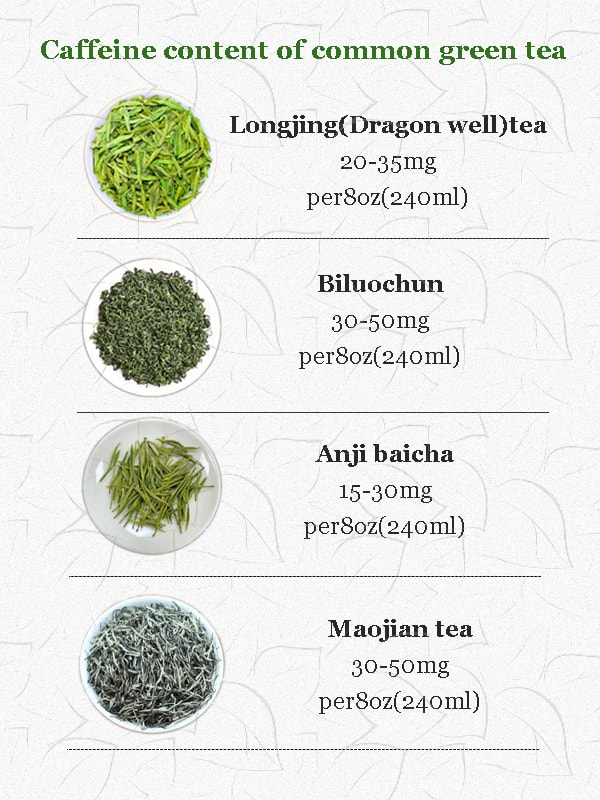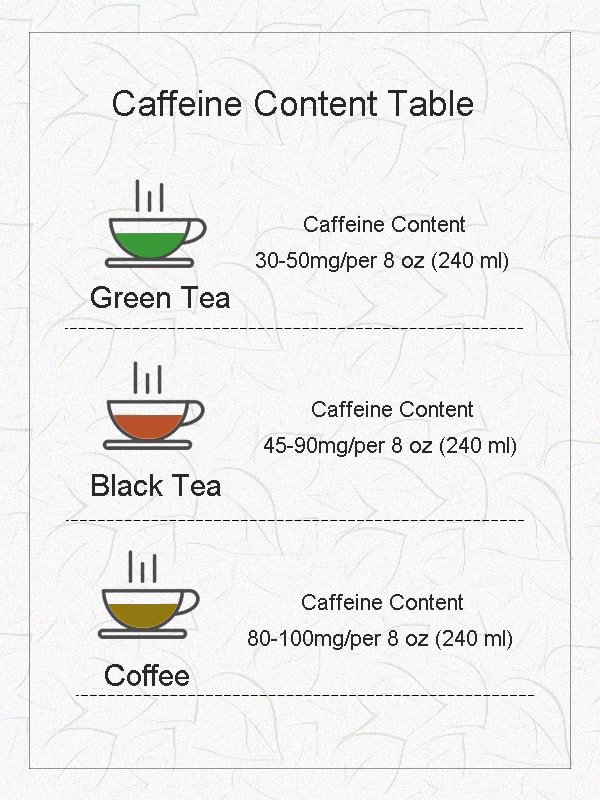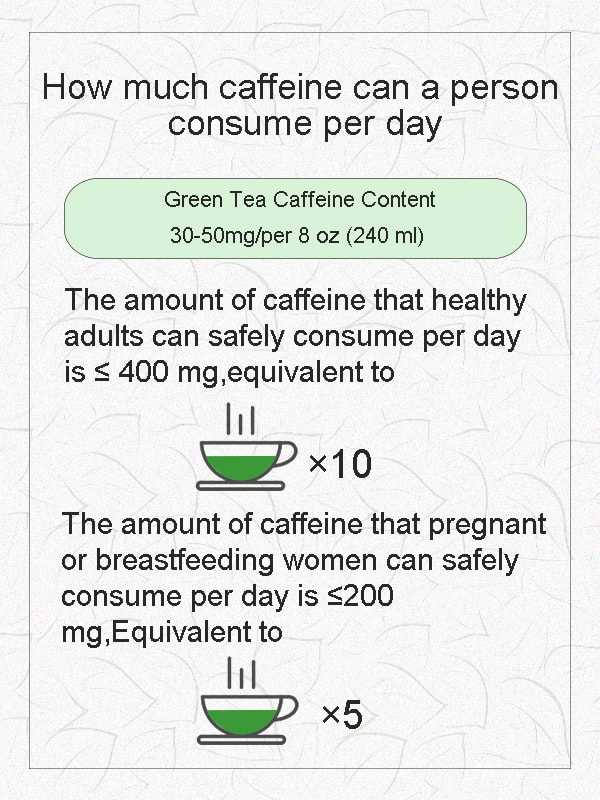
Does green tea have caffeine?
钱多福Share
Refreshing, invigorating, and naturally energizing—green tea offers a gentle boost without the harshness of coffee. Green tea contains less caffeine than other teas, refer to our full guide, "Caffeine in Tea."
For a complete overview of green tea types, brewing, and storage, you can read our Green Tea Guide.
In this article, we'll examine the caffeine content of green tea in detail.
More and more people like to drink green tea because it has many health benefits, but at the same time, we are also worried about its caffeine level and whether it will have any effect on us.Let's take a look.
Does Green Tea Have Caffeine?
Green tea is a popular tea made from the unoxidized leaves of the Camellia sinensis bush, rich in antioxidants and naturally containing caffeine.
The amount of caffeine in green teas varies depending on factors such as types of tea, brewing method, and temperature.
How much caffeine is in green tea?
On average, an 8-ounce cup of green tea contains 30 to 50 milligrams of caffeine.
Green tea has less caffeine than black tea and coffee, making it a popular choice for those who want to enjoy the benefits of tea without too much caffeine. The European Food Safety Authority recommends a maximum daily caffeine intake of 400mg, making green tea a moderate and safe choice for daily consumption.
How much caffeine does different varieties of green tea contain?
Different varieties of green tea have different caffeine contents.

|
Tea Type |
Caffeine Content:per 8 oz (240 ml) cup |
Details |
Longjing(Dragon Well)tea |
20–35 mg
|
Longjing is one of the most famous Chinese green teas. It is pan-fired (roasted in a pan) rather than steamed, which may affect the caffeine extraction. The caffeine content is moderate and varies depending on how it's brewed. |
Biluochun tea |
30–50 mg |
Biluochun is a famous Chinese green tea from the Jiangsu province, is known for its delicate, curly leaves and fragrant, floral aroma. The caffeine content in Biluochun can vary depending on factors such as growing conditions, leaf quality, and brewing methods. |
Anji baicha |
15–30 mg |
is a high-quality Chinese tea, often considered a green tea due to its processing method, though it has the name "white" in it. It's grown in Anji County in Zhejiang Province and is known for its delicate, light flavor and high concentration of amino acids like L-theanine. |
West Lake(Xihu) Longjing tea |
30–45 mg |
One of the most famous and prestigious green teas from China, has a moderate caffeine content, typical for high-quality green teas. |
Maojian tea |
30–50 mg |
A popular Chinese green tea, has a moderate caffeine content, which can vary slightly depending on the specific variety and how it's brewed. |
Caffeine Content Comparison with Other Beverages

When comparing green tea to other popular beverages, it stands out for its moderate caffeine content. An 8-ounce cup of green tea typically contains 30-50 milligrams of caffeine, which is less than black tea and coffee. For instance, black tea contains about 45-90 milligrams of caffeine per 8-ounce cup, while coffee ranges from 80-100 milligrams. Despite having less caffeine, green tea can still boost alertness due to the presence of L-theanine, an amino acid that promotes relaxation and reduces stress. Matcha, a powdered form of green tea, contains more caffeine than regular green tea, averaging 35-40 milligrams per 8-ounce cup.
Factors Affecting Caffeine Intake from Green Tea
The caffeine content of green tea can be affected by factors such as the type of green tea, brewing time, and water temperature.
Earlier harvests may contain a higher caffeine content, while shorter steeping times can reduce caffeine levels.
Polyphenols in the tea can bind to caffeine, making it less available for absorption.
The amount of caffeine in green tea can also vary depending on the brand and type of tea.
Health Benefits of Drinking Green Tea
- Drinking green tea has been shown to have numerous health benefits, including improving heart health, reducing the risk of stroke, and aiding in weight loss.
- Green tea is rich in antioxidants, including polyphenols, which may help reduce inflammation and improve overall health.
- Green tea has been shown to have anti-inflammatory properties and may help improve brain function and digestion.
- The FDA has approved a topical green tea extract treatment for genital warts.
Managing Caffeine Intake from Green Tea

- Healthy adults can safely consume up to 400 milligrams of caffeine per day, equivalent to about 5 cups of coffee or 10 cups of green tea.
- Factors such as body weight, medications, and individual tolerance can affect how much caffeine is safe to consume.
- Signs of excessive caffeine consumption include jitters, anxiousness, headache, nausea, insomnia, and increased heart rate.
- Pregnant or breastfeeding women should limit their caffeine intake to 200 milligrams or less per day.
Best Time to Consume Caffeinated Green Tea
Caffeinated green tea is fine to drink at any other time of the day, but if you're more sensitive to the effects of caffeine, drinking it in the morning is best.
Avoid drinking caffeinated tea in the afternoon or evening to prevent potential sleep problems.
Some people experience side effects of caffeine, including jitters, anxiousness, and insomnia.
Decaf Green Tea Options
Decaffeinated green tea is available for those who are sensitive to caffeine or want to monitor their caffeine intake.
Decaf green tea can still provide health benefits, including improved brain function and weight loss.
Decaf green tea may also protect against certain forms of cancer and heart disease.
Maximizing the Benefits of Green Tea
To maximize the benefits of green tea, choose a high-quality loose leaf tea or tea bags.Brew green tea according to the package instructions to ensure optimal caffeine content and flavor.
Consider combining green tea with other healthy habits, such as a balanced diet and regular exercise, to enhance its health benefits.Always check with your doctor before taking supplements and follow dosing instructions carefully.
Already know about green tea caffeine,Come and make a pot of green tea and enjoy it.
You can explore more essential techniques in our main Green Tea Guide.
Green tea offers light stimulation and a calming balance -perfect for daily sipping.Other teas also have their own unique characteristics.
For a broader look at caffeine levels in all tea types, explore our detailed guide - Caffeine in Tea.









